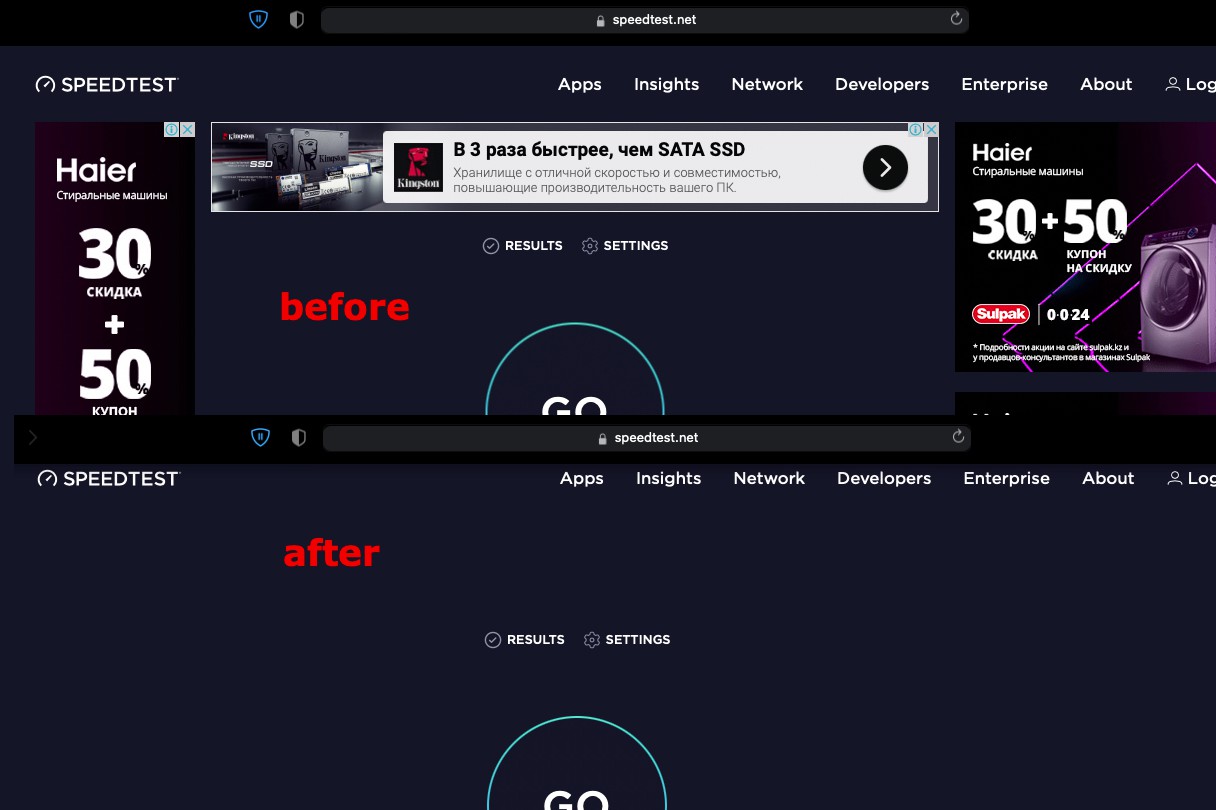How it Works
OpenBLD.net DNS is a multi-compatible, simple, fast service with in different locations of the world. OpenBLD DNS it is a open DNS service.
- Easily - Simple using without software installations. OpenBLD.net works in several modes - Adaptive (ADA), Strict (RIC), OpenBLD+.
- Multi-compatible - Enough to configure the private settings of the browser, mobile device (Android 9+, iOS 14+ are supported) or configure OpenBLD DNS on a home or office router and feel the "OpenBLD effect" �🌱

Operating Modes
- Adaptive (ADA) - Recommended for most users
- Strict (RIC) - Recommended for advanced users
- OpenBLD+ (BLD+) - Personal or Enterprise support. Get more details.
OpenBLD Plus - This includes personal support, no limits on redundant requests, analysis of security or technical incidents. It is provided based on monthly donations in the amount of $15+ or similar in any other currency. See details here.
ADA vs RIC
The key difference between ADA and RIC in OpenBLD.net DNS is that ADA allows various services such as Yandex, TikTok, Facebook, etc. By "various services," we mean services for managing marketing cabinets or business tools.
What Does ADA Allow?
- Social media tools (e.g., Facebook, Twitter, LinkedIn, TikTok, etc.)
- All Yandex tools (Alice, Kinopoisk, etc.)
- All Google tools
- Advertising links from search results
- Etc.
OpenBLD.net uses a granular approach. If ADA allows, for example, all Yandex resources, then RIC allows key services (for example: mail, passport, money, etc.). In simple terms, RIC is a more "strict" service that can affect some Internet services.
ADA is an OpenBLD.net "add-on," adapted and suitable for most users of the OpenBLD.net DNS service.
Locations
- 🇪🇺 Europe (Bulgaria, Finland, Germany, Latvia, Poland, Sweden, the Netherlands)
- 🇰🇿 Asia (Kazakhstan)
- 🇯🇵 Japan (Tokyo)
- 🇨🇦 North America (Canada)
- 🇺🇸 USA (Silicon Valley)
Some servers, rarely, but may change IP addresses. All changes are usually reported in the official Telegram channel of the project cee Contact for more details.
Connectives
OpenBLD.net supports IPv4 and IPv6 (testing) and can be used in different ways:
- DoH ADA:
https://ada.openbld.net/dns-query
- DoT ADA:
ada.openbld.net
- DoH RIC:
https://ric.openbld.net/dns-query
- DoT RIC:
ric.openbld.net
- IPv4 and IPv6 -
Under Maintenanceif you really need IP addresses, please contact us through Contacts page.
See more details how to setup your devices on Where to start page.
Preferred way to use DoH or DoT. IP addresses can be changed in the future, keep this in mind before setup IP DNS.
Rules of use
Limitations
You can use OpenBLD.net as regular DNS service, but it has some limitations:
- Without special requests, such as AXFR, ANY etc.
- Without brute-force domain or subdomain names, etc.
- No more than 100 requests per second from one IP address.
- Without abuse of the service.
- Without any other malicious activity.
- Free for private use. For organizations, a OpenBLD Plus subscription is required.
virtual servers from cloud environments will be blocked automatically
Otherwise, your requests and IP addresses can be blocked, if this happens by mistake or you suspect that malicious activity has appeared on your network, or if you have any questions, please contact us through Contacts page or try to get OpenBLD Plus service.
Exceptions
OpenBLD does not cover YouTube.
Privacy
Logs from Services, and Server data:
- Can be enabled for troubleshooting problems.
- Not transferred to third-party services.
- Not be collected for advertising purposes.
- Can be used to improve the quality of the service.
- Can be using for alerting notifications.
- Logs are not collected or aggregated centrally.
- Are not used for any other purposes.
Disclaimer Statement
This project is supported by personal activities and resources (such as time and money). The author of the service and the testing team aim to focus on a cleaner Internet and garbage-free content.
This service is supported by the author and donation from service users, and it is maintained as far as possible. It has no Service Level Agreement (SLA), so keep this in mind when using OpenBLD DNS services.
- See full Disclaimer Statement here
Technology Stack
OpenBLD.net try to use Open-Sourced and Free or Freemium projects - code, packages, distros, clouds and etc.
Thanks for Open Source initiatives and projects:
Ansible, Blocky, Bulma, Cactusd, Caddy CentOS, Debian, Fedora, Grafana, Knot DNS, Nginx, Node.js, Nuxt, PowerDNS, Prometheus, React, Tailwind, Vue, zBLD
And platforms and services:
- ZeroSSL, ClouDNS, Cloudflare, GCore, Unihost.kz, GoHost.kz, UptimeRobot, Netdata, Digital Ocean, PowerDMARC, GitHub
Thanks to Communities
Many people are concerned about the Internet and its future. Thanks to all communities and people who are trying to make the Internet a better, safer and cleaner place!
OpenBLD.net aggregates data from many sources, such as:
FadeMind, StevenBlack, notracking, davidonzo, mitchellkrogza, oisd, PolishFiltersTeam, dns-hole, bld-agregator, digitalside, firehol level1, firehol level2, feodotracker, stamparm, hagezi dns-blocklists
Of course, thanks to many other projects, packages, distros, code languages, technologies etc. which provide Open Source and Free, Freemium software and companies / services which can support projects with opened initiatives. 🤜🤛
Project Chronology
- 2019-2023 - The project was launched as a personal initiative known as Sys-Adm.in BLD (codename: aBLD, which stood "Additional Blocky Listener Daemon")
- 2023-Current time - OpenBLD.net was formed as an independent project, where the entire technological stack was updated from scratch and the entire code base was rewritten, taking into account the use of new technologies and packages (codename: zBLD, which stands "Zero-Trust BlockList DNS") with features and services named Gears and OpenBLD Plus.
Providing Feedback
You can be sent feedback through Contacts page.